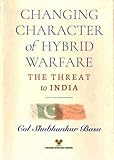Changing character of hybrid war : the threat to India / by Shubhankar Basu
By: Basu, Shubhankar.
Contributor(s): Vivekananda International Foundation (New Delhi, India).
Publisher: New Delhi : Pentagon Press LLP, 2020Description: xx,183 p. : illustrations, maps ; 23cm.ISBN: 9788194465980.Other title: Hybrid war.Subject(s): Asymmetric warfare | Hybrid warfare | Irregular warfare | National security | -- IndiaDDC classification: 355.033054 Summary: India’s security dilemmas are complex, with two hostile powers on its frontiers and a large number of internal fault lines which are vulnerable and have been exploited by the adversaries in the past. The Indian Army Doctrine of 2018 defines ‘the collusive external threat from adversaries as well as the internal instability due to state/non-state sponsored proxy war’ as the primary security challenge to India. It further amplifies the changing character of war as ‘wars will be hybrid in nature, a blend of conventional and unconventional, with focus increasingly shifting to multi domain warfare varying from non-contact to contact warfare’. In a nutshell therefore hybrid war is among the primary areas of focus for the Indian military today. ‘Changing Character of Hybrid War: The Threat to India’ examines the transformation in hybrid warfare and analyses its threat to India. It begins with an analysis of the doctrine adopted by the US, Russia, China, UK & NATO in dealing with this threat. Thereafter it illuminates the emerging characteristics of hybrid war by exploring certain case studies from major contemporary conflicts. India`s primary challenge in this area is of a collusive hybrid war from Pakistan and China. Accordingly, the book analyses the strategic culture of Pakistan Army and transformation of the People`s Liberation Army (PLA) to ascertain their views on hybrid warfare.| Item type | Current location | Call number | Status | Date due | Barcode |
|---|---|---|---|---|---|
 Books
Books
|
NASSDOC Library | 355.033054 BAS-C (Browse shelf) | Available | 53910 |
Browsing NASSDOC Library Shelves Close shelf browser

|

|

|

|

|

|

|
||
| 355.03305 NON- Non-traditional security in Asia: dilemmas in securitization | 355.03305 STR- Strategic stability in Asia | 355.0330536 ASK-M Militarization of the Persian Gulf: an economic analysis | 355.033054 BAS-C Changing character of hybrid war : | 355.033054 GUP-H How India manages its national security | 355.033054 JOS-I Indian Power Projection: | 355.033054 KUN-M Militarism in India : the Army and Civil Society in Consensus |
"Vivekananda International Foundation, New Delhi."
Includes bibliographical references and index.
India’s security dilemmas are complex, with two hostile powers on its frontiers and a large number of internal fault lines which are vulnerable and have been exploited by the adversaries in the past. The Indian Army Doctrine of 2018 defines ‘the collusive external threat from adversaries as well as the internal instability due to state/non-state sponsored proxy war’ as the primary security challenge to India. It further amplifies the changing character of war as ‘wars will be hybrid in nature, a blend of conventional and unconventional, with focus increasingly shifting to multi domain warfare varying from non-contact to contact warfare’. In a nutshell therefore hybrid war is among the primary areas of focus for the Indian military today. ‘Changing Character of Hybrid War: The Threat to India’ examines the transformation in hybrid warfare and analyses its threat to India. It begins with an analysis of the doctrine adopted by the US, Russia, China, UK & NATO in dealing with this threat. Thereafter it illuminates the emerging characteristics of hybrid war by exploring certain case studies from major contemporary conflicts. India`s primary challenge in this area is of a collusive hybrid war from Pakistan and China. Accordingly, the book analyses the strategic culture of Pakistan Army and transformation of the People`s Liberation Army (PLA) to ascertain their views on hybrid warfare.


There are no comments for this item.